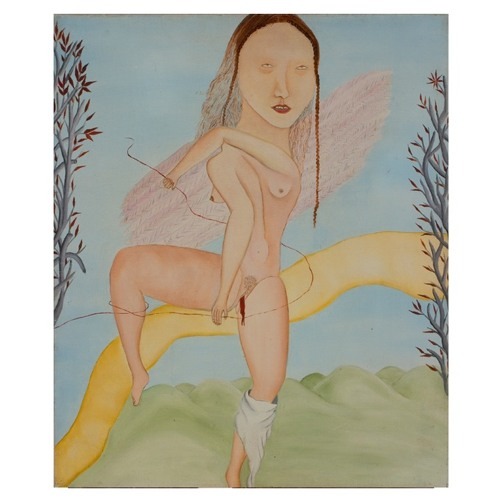Cecilia Vicuña
a retrospective exhibition
26 May - 10 Nov 2019

Detail of: Cecilia Vicuña, Ángel de la menstruación [Menstruation Angel], 1973, oil on canvas, 57.1 × 48.2 cm. Photo: England & Co Gallery, London. Collection Catherine Petitgas
Cecilia Vicuña, a retrospective exhibition
26 May — 10 November 2019
Cecilia Vicuña, a retrospective exhibition brings together over a hundred works by the poet, visual artist, and activist Cecilia Vicuña. Since the 1960s, the artist has constituted a radical perspective on the relationship between art and politics through her writing and art making. She has done so in different parts of the world, leaving her native Chile for London in 1973, before basing herself in the United States since 1980.
The 1973 military coup d’état in Chile shaped the structures of feeling in Vicuña’s formative years, as it did for an entire nation. In many ways, her work has been, and continues to be, triggered and inspired by political resistance. Feminist and sociological methods, as well as indigenous culture and natural materials imbue her art practice. For decades, she has developed a varied and multidisciplinary body of work, which at times relies on words, images, environments, and a combination of languages, mediums, and techniques.
For her exhibition retrospective organized by Witte de With and developed by guest curator Miguel A. López, a number of artworks, documents, and ephemera are presented for the first time. Most have been sourced from Vicuña’s personal archives at her home and studio. This material, which enables a more comprehensive understanding of the artist’s practice, is joined by a number of artworks on loan, which span several decades of production. Significant chapters within Vicuña’s multifaceted practice are delved into and showcased. From her long-term quipu, precarios [precarious objects], and palabrarmas series, through to her painterly works, her work made in solidarity with Vietnam and as part of the collectives Tribu No [No Tribe] and Artists for Democracy, as well as a number of her films, which in turn point to the artist’s extensive performance practice.
López, who is originally from Peru and who has collaborated closely with Vicuña over the years, has remarked that, “her flashes of inventive brilliance –whether literary, visual, performed, or audible– defy all conventional categories, through the weaving of word and seed, sound and thread, quipu and blood, body and dust, rubbish and cosmos.”
Accompanying the exhibition is the publication Cecilia Vicuna: Seehearing the Enlightened Failure edited by López and published by Witte de With. It brings together three new and two existing essays on Vicuña’s work, and an anthology of diverse texts authored by the artist. Included, too, is a plethora of artwork images and visual documentation organized in four thematic sections, which encompass the full range of mediums the artist has worked in over the years.
At Witte de With, the exhibition has been coordinated by Rosa de Graaf; its publication by Wendy van Slagmaat-Bos; its exhibition design by Sofía Hernández Chong Cuy and Paul van Gennip. Andrea Valencia and Karla Hinojosa assisted in the process as curatorial interns in 2018 and 2019, respectively.
Curator: Miguel A. López
26 May — 10 November 2019
Cecilia Vicuña, a retrospective exhibition brings together over a hundred works by the poet, visual artist, and activist Cecilia Vicuña. Since the 1960s, the artist has constituted a radical perspective on the relationship between art and politics through her writing and art making. She has done so in different parts of the world, leaving her native Chile for London in 1973, before basing herself in the United States since 1980.
The 1973 military coup d’état in Chile shaped the structures of feeling in Vicuña’s formative years, as it did for an entire nation. In many ways, her work has been, and continues to be, triggered and inspired by political resistance. Feminist and sociological methods, as well as indigenous culture and natural materials imbue her art practice. For decades, she has developed a varied and multidisciplinary body of work, which at times relies on words, images, environments, and a combination of languages, mediums, and techniques.
For her exhibition retrospective organized by Witte de With and developed by guest curator Miguel A. López, a number of artworks, documents, and ephemera are presented for the first time. Most have been sourced from Vicuña’s personal archives at her home and studio. This material, which enables a more comprehensive understanding of the artist’s practice, is joined by a number of artworks on loan, which span several decades of production. Significant chapters within Vicuña’s multifaceted practice are delved into and showcased. From her long-term quipu, precarios [precarious objects], and palabrarmas series, through to her painterly works, her work made in solidarity with Vietnam and as part of the collectives Tribu No [No Tribe] and Artists for Democracy, as well as a number of her films, which in turn point to the artist’s extensive performance practice.
López, who is originally from Peru and who has collaborated closely with Vicuña over the years, has remarked that, “her flashes of inventive brilliance –whether literary, visual, performed, or audible– defy all conventional categories, through the weaving of word and seed, sound and thread, quipu and blood, body and dust, rubbish and cosmos.”
Accompanying the exhibition is the publication Cecilia Vicuna: Seehearing the Enlightened Failure edited by López and published by Witte de With. It brings together three new and two existing essays on Vicuña’s work, and an anthology of diverse texts authored by the artist. Included, too, is a plethora of artwork images and visual documentation organized in four thematic sections, which encompass the full range of mediums the artist has worked in over the years.
At Witte de With, the exhibition has been coordinated by Rosa de Graaf; its publication by Wendy van Slagmaat-Bos; its exhibition design by Sofía Hernández Chong Cuy and Paul van Gennip. Andrea Valencia and Karla Hinojosa assisted in the process as curatorial interns in 2018 and 2019, respectively.
Curator: Miguel A. López
